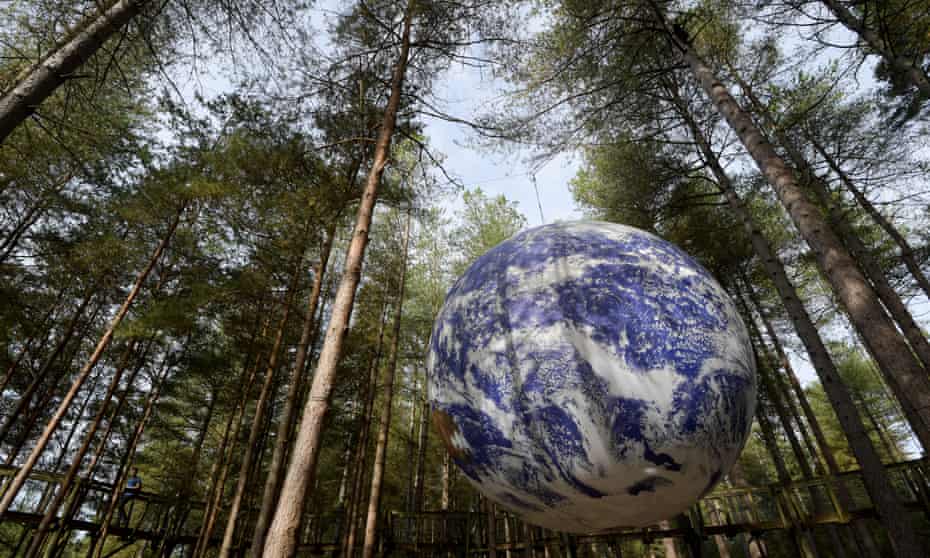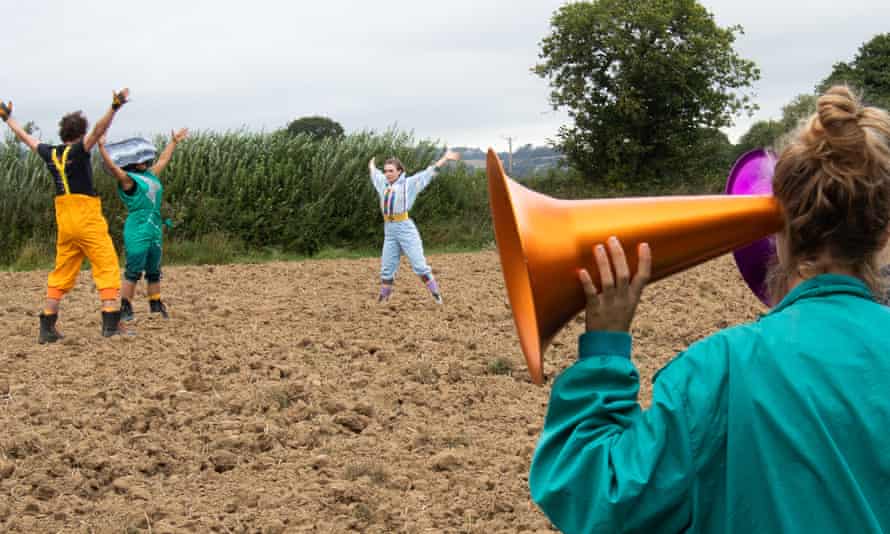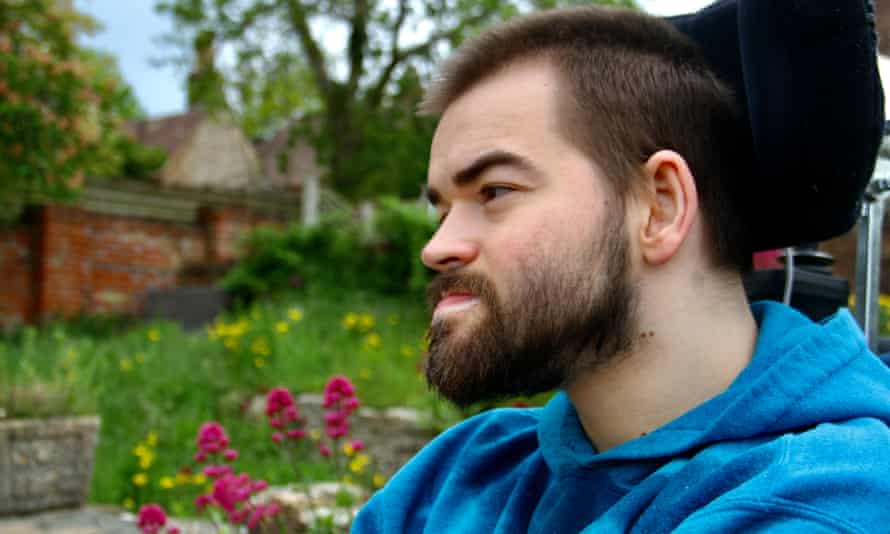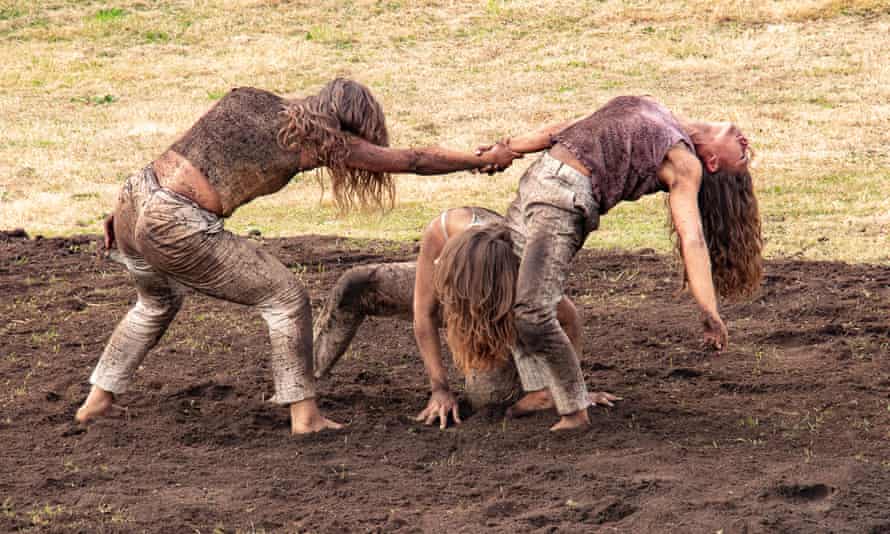Stop, look and listen: artists’ startling responses to the climate crisis

Dorset’s Inside Out festival brought audiences closer to nature with rock star-guided rambles, dirt-digging dances and a globe suspended in woodland
Have you held a seashell to your ear, imagined the sound of the ocean and felt closer to nature for a few seconds? In Geophonic, a new outdoor performance about deep earth processes, theatre-maker Lorna Rees runs with a similar idea. Or rather, rambles. We are slowly snaking our way around a 2.5km path on the Symondsbury Estate near Bridport, in Dorset, holding what look like shiny traffic cones to our ears and listening to the ground beneath our feet.
One of the new commissions at Symondsbury for the biennial Inside Out festival, Geophonic sharpens our senses to the environment and keeps them alert for an hour with a soundscape that includes naturally occurring noises, augmented effects, folk songs and even, for its finale, the Temptations’ floor-filler Shakey Ground. We’re encouraged to keep quiet and listen up: at first to the crunch of our shoes, the trot of two passing horses and bursts of birdsong. But, wielding our ear trumpets, we begin to hear recordings of bubbling water, wind and geological processes that have been collected from rivers around Dorset and from coal mines in Yorkshire and Wales, the sounds all played on little speakers dotted along the trail.

Who better to guide us through this paean to the rock cycle than a rock band? Rees is one of a group of performers dressed in Ziggy Stardust-style outfits, with headdresses evoking coal and quartz, cycling ahead of us through the countryside and pausing to stage brief dance-theatre routines that are both comical and solemn as they evoke igneous, sedimentary and metamorphic rock types. It’s as bizarre as it sounds, doesn’t take itself too seriously, but grows increasingly profound. Watching ancient earth processes enacted in flashy futuristic costumes, the effect is repeatedly given of our fleeting spell as visitors on a planet that has outlived so much. We walk along and pause to see the group act out various rituals, their voices amplified in our cones, but often these stony-faced rock stars simply observe us right back as if studying and questioning our own behaviours over time.
That’s a familiar theme connecting several of the Symondsbury productions that confront the climate crisis. Partnering with Earth, created by performance poet and artist Dave, the Shouting Mute, is a brief but ruminative piece staged in a courtyard by the estate’s thatched-roof buildings. It invites us to consider our personal relationship with the planet, almost akin to a family therapy session encouraging us to give more and take less. The performance grows around us. At first, we hear voices from speakers concealed among plants reminding us, like Geophonic, that “the whole world isn’t just humans”. Then we join a clueless prime minister as he bluffs his way through a climate emergency summit, spouting empty rhetoric rather than engaging with the issues, letting slip that there’s one plan for him (an underground bunker) while the meek will inherit the Earth’s crisis.

On the table of a fully recycled set we are invited to write eco-friendly ideas, big and small, and make vows to the planet, with much weight given to those by younger audience members. Across the festival, children are rightly at the heart of these conversations about the climate. Partnering with Earth features a Mother Earth character, whose pregnant belly bears a globelike design, while another character’s dress combines a toadstool with thread evoking flowing streams. It’s sustainable too: her dress is destined to become a bug hotel after the performance has finished.

For the dancers in Becky Namgauds‘ Rodadoras, the earth is as much a costume as their vests. Namgauds’ creation is like an earthier version of Pina Bausch’s Rite of Spring that goes a step further than using a stage covered in soil. Performing in the drizzle, on a muddy strip of field, the trio of women are first seen in a heap, faces hidden by their long hair, slowly morphing into what looks like a giant creepy-crawly that shivers and itches to the sound of percussion. The women rub soil into their limbs and locks, separating for a series of solos, but always seeming interconnected. If this beast has grown out of the soil it clearly wants to return – bodies thud to the ground repeatedly, as if desperate to be subsumed.
This is a festival that presents fresh perspectives on Earth and a first glimpse of Luke Jerram‘s Gaia is startling. Jerram has created a huge replica of the planet, seven metres in diameter, which has been suspended in a woodland clearing. As we walk towards it, only the edges are visible – as if it is a football that has been punted into the undergrowth. But the point is to see it as astronauts have and audiences orbit the dangling globe. Jerram’s installation uses 120dpi detailed Nasa imagery of the Earth’s surface and an accompanying score by Dan Jones matches the swirl of the clouds. It’s an awe-inspiring sight but blimey this globe looks delicate. “If nature gets destroyed, humans get destroyed,” we hear a child observe as part of the soundscape. “It will take radical action to save us,” says another. Meanwhile, audience members big and small perfect a way to pose before the artwork as if they are holding or propping up the Earth. As each of the day’s events show, its future really is in our hands.
-
Inside Out ran in Dorset from 17-26 September.
